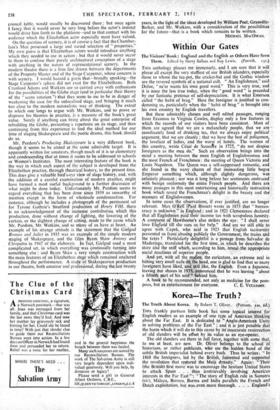Within Our Gates
Tests anthology pleases me immensely, and I am sure that it will please all except the very stuffiest of our British islanders, especially those to whom the tea-pot, the cricket-bat and the Gothic window are the revered symbols of a national cult. " An Englishman," said Defoe, " ne'er wants his-own good word." This is very true, and it is none the less true today, when the " good word " is preceded by our fantastic pretence of self-depreciation. It is what Emerson called " the habit of brag." Here the foreigner is justified in con- demning us, particularly when the " habit of brag " is brought into his own country by English travellers.
But these admirably chosen and well edited passages, ranging from Erasmus to Virginia Cowles, display only a few features in which the records of our visitors have been consistent. Most of them are agreed that we are a melancholy people, that we are inordinately fond of drinking tea, that we always enjoy political argument, that we are cleanly ; that we have the best of policemen, the loveliest of ladies, and the worst of hotels. The women of this country, wrote Cisar de Sausstfie in 1725, " do not despise foreigners as the men do." Such an observation brings into the mind a meeting between the most English of Englishwomen and the most French of Frenchmen: the meeting of Queen Victoria and Louis Napoleon. The Queen was a self-suppressed romantic, and she found in the waxy charm of that insinuating little bogus Emperor something which, although slightly dangerous, was infinitely pleasant ; nor was it long before her sentiments embraced with benign uniformity the entire French people. And there am many passages in this most entertaining and historically instructiva:, book which reveal the Frenchman's delight in the beauty and the. manners of Englishwomen.
In some cases the observations, if ever justified, are no longer relevant. Max 0:Rell(P,aul Blouet) wrote in 1873 that " bureau- cracy is unknown " in England.; and in 1921 Clemenceau declared that all Englishmen paid their income tax With scrupulous honesty. A comment. of Hawthorne's -also strikes the eye:_ " I shalt never love Engfalid till she sues us for help." •And are we still able to agree • with Capek, who said in 1923 that English taciturnity prevented us froM'abusing publicly the Government, the trains and the taxes ? Partidularly delightful is a passage from Salvador de Madariaga, translated for the first time,, in which he describes the stare and the sniff which, according to him, reveal. the appro-priate social reactions of superior people.
And yet, with all the malice, the caricature, an extreme zeal in hitting very small nails on the head, one is glad to find that so many foreigners have liked, and still like, the English. Even a Japanese, leavinc Our shores in 1935, announced that he was leaving "about a fiftieth part of his soul " behind him.
A book to be recommended, not only as medicine for the pom-
pous, but as entertainment for everyone. C. E. VULUAMY.


































 Previous page
Previous page